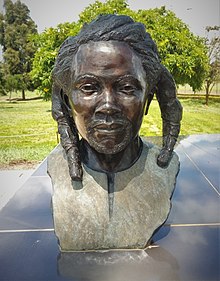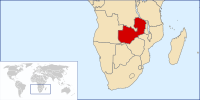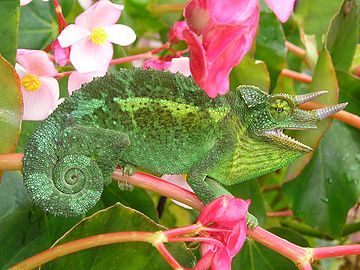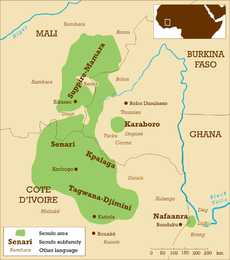Portal:Africa



Africa is the world's second-largest and second-most populous continent after Asia. At about 30.3 million km2 (11.7 million square miles) including adjacent islands, it covers 20% of Earth's land area and 6% of its total surface area. With nearly 1.4 billion people as of 2021, it accounts for about 18% of the world's human population. Africa's population is the youngest among all the continents; the median age in 2012 was 19.7, when the worldwide median age was 30.4. Despite a wide range of natural resources, Africa is the least wealthy continent per capita and second-least wealthy by total wealth, ahead of Oceania. Scholars have attributed this to different factors including geography, climate, corruption, colonialism, the Cold War, and neocolonialism. Despite this low concentration of wealth, recent economic expansion and a large and young population make Africa an important economic market in the broader global context. Africa has a large quantity of natural resources and food resources, including diamonds, sugar, salt, gold, iron, cobalt, uranium, copper, bauxite, silver, petroleum, natural gas, cocoa beans, and.
Africa straddles the equator and the prime meridian. It is the only continent to stretch from the northern temperate to the southern temperate zones. The majority of the continent and its countries are in the Northern Hemisphere, with a substantial portion and a number of countries in the Southern Hemisphere. Most of the continent lies in the tropics, except for a large part of Western Sahara, Algeria, Libya and Egypt, the northern tip of Mauritania, and the entire territories of Morocco, Ceuta, Melilla, and Tunisia, which in turn are located above the tropic of Cancer, in the northern temperate zone. In the other extreme of the continent, southern Namibia, southern Botswana, great parts of South Africa, the entire territories of Lesotho and Eswatini and the southern tips of Mozambique and Madagascar are located below the tropic of Capricorn, in the southern temperate zone.
Africa is highly biodiverse; it is the continent with the largest number of megafauna species, as it was least affected by the extinction of the Pleistocene megafauna. However, Africa also is heavily affected by a wide range of environmental issues, including desertification, deforestation, water scarcity, and pollution. These entrenched environmental concerns are expected to worsen as climate change impacts Africa. The UN Intergovernmental Panel on Climate Change has identified Africa as the continent most vulnerable to climate change.
The history of Africa is long, complex, and varied, and has often been under-appreciated by the global historical community. In African societies, the historical process is largely a communal one, with eyewitness accounts, hearsay, reminiscences, and occasionally visions, dreams, and hallucinations, crafted into oral traditions and preserved orally. Truth is generally viewed as relativist. Africa, particularly Eastern Africa, is widely accepted to be the place of origin of humans and the Hominidae clade, also known as the great apes. The earliest hominids and their ancestors have been dated to around 7 million years ago, including Sahelanthropus, Australopithecus africanus, A. afarensis, Homo erectus, H. habilis and H. ergaster, the earliest Homo sapiens (modern human) remains, found in Ethiopia, South Africa, and Morocco, date to circa 233,000, 259,000, and 300,000 years ago, respectively, and Homo sapiens is believed to have originated in Africa around 350,000–260,000 years ago. Africa is also considered by anthropologists to be the most genetically diverse continent as a result of being the longest inhabited. (Full article...)
Selected article –
The Egyptian–Libyan War, also known as the Four Day War (Arabic: حرب الأربعة أيام, romanized: ḥarb al-ārbaʿ ʾayyām), was a short border war fought between Libya and Egypt that lasted from 21 to 24 July 1977. The conflict stemmed from a deterioration in relations that had occurred between the two states after Egyptian President Anwar Sadat had rebuffed Libyan leader Muammar Gaddafi's entreaties to unify their countries and had pursued a peace settlement with Israel in the aftermath of the Yom Kippur War in 1973. Soon thereafter Libya began sponsoring dissidents and assassination plots to undermine Sadat, and Egypt responded in kind to weaken Gaddafi. In early 1976 Gaddafi dispatched troops to the Egyptian frontier where they began clashing with border guards. Sadat responded by moving many troops to the area, while the Egyptian General Staff drew up plans for an invasion to depose Gaddafi.
Clashes along the border intensified in July 1977. On 21 July a Libyan tank battalion raided the town of Sallum. The Egyptian forces ambushed it and subsequently launched a large counter-attack, conducting airstrikes against Gamal Abdel Nasser Airbase and sending a mechanised force 24 kilometres (15 mi) into Libyan territory before withdrawing. Over the next two days, heavy artillery fire was exchanged across the border, while Egyptian jets and commandos raided Libyan locales. On 24 July the Egyptians launched a larger raid against Nasser Airbase and struck Libyan supply depots. Under significant pressure from the United States to end the attacks, and attempts from President of Algeria Houari Boumediène and Palestine Liberation Organisation leader Yasser Arafat to mediate a solution, Sadat suddenly declared a ceasefire. Sporadic fighting occurred over the next few days as Egyptian troops withdrew across the border. Relations between the two countries remained tense, and, though a formal agreement was never reached, both upheld a truce and gradually withdrew their forces from the border. Gaddafi softened his rhetoric against Egypt in the following years but actively rallied other Arab states to isolate the country. (Full article...)Featured pictures –
Did you know (auto-generated) -

- ... that South African civil rights activist Thambi Naidoo was arrested along with Mahatma Gandhi and sent outside of Transvaal for refusing to register?
- ... that in a study for UNICEF, Reginald Green found that more than two million children under the age of five had died in Angola and Mozambique due to the South African apartheid regime's economic policies?
- ... that the Octavius V. Catto Memorial, unveiled in 2017, contains the first statue on Philadelphia public property of a specific African American?
- ... that Ruth L. Bennett provided shelter for more than 2,000 black women and girls who migrated north to Chester, Pennsylvania, as part of the Great Migration?
- ... that makwerekwere is the South African equivalent of "barbarians", an offensive and derogatory slur used to refer to foreigners?
- ... that 555 Edgecombe Avenue, once named for a British soldier and occupied entirely by white Americans, later attracted notable African Americans like Paul Robeson and Count Basie?
Categories
Selected biography –

Dedan Kimathi Waciuri (born Kimathi wa Waciuri; 31 October 1920 – 18 February 1957) was the senior military and spiritual leader of the Mau Mau Uprising. Widely regarded as a revolutionary leader, he led the armed military struggle against the British colonial regime in Kenya in the 1950s until his capture in 1956 and execution in 1957. Kimathi is credited with leading efforts to create formal military structures within the Mau Mau, and convening a war council in 1953. He, along with Baimungi M'marete, Musa Mwariama, Kubu Kubu, General China and Muthoni Kirima, was one of the Field Marshals.
Kenyan nationalists view him as the heroic figurehead of the Kenyan freedom struggle against British colonial rule, while the British government saw him as a terrorist. Despite being viewed with disdain by the first two presidents of independent Kenya, Jomo Kenyatta and Daniel arap Moi, Kimathi and his fellow Mau Mau rebels were officially recognised as heroes in the struggle for Kenyan independence under the Mwai Kibaki administration, culminating in the unveiling of a Kimathi statue in 2007. This was reinforced by the passage of a new Constitution in 2010 calling for recognition of national heroes. (Full article...)Selected country –
 |
 |
||

| |||
Zambia, officially the Republic of Zambia (formerly Northern Rhodesia), is a landlocked country in Southern Africa. It borders the Democratic Republic of the Congo to the north, Tanzania to the north-east, Malawi to the east, Mozambique, Zimbabwe, Botswana, and Namibia to the south, and Angola to the west.
Zambia's politics takes place in a framework of a presidential representative democratic republic, whereby the President of Zambia is both head of state and head of government in a multi-party system. Executive power is exercised by the government. Legislative power is vested in both the government and parliament.
The official language is English, used to conduct official business and is the medium of instruction in schools. Commonly-spoken indigenous languages include the 7 major languages: Chibemba, Chinyanja, Lunda, Chitonga, Kaonde, Silozi and Luvale. (Read more...)
Selected city –

Windhoek (/ˈwɪndhʊk/, Afrikaans: [ˈvəntɦuk] ; ‹See Tfd›German: Windhuk [ˈvɪnthʊk] ; Khoekhoe: ǀAi-ǁGams; Otjiherero: Otjomuise) is the capital and largest city of Namibia. It is located in central Namibia in the Khomas Highland plateau area, at around 1,700 m (5,600 ft) above sea level, almost exactly at the country's geographical centre. The population of Windhoek, which was 486,169 in 2023, is constantly growing due to a continued migration from other regions in Namibia.
Windhoek is the social, economic, political, and cultural centre of the country. Nearly every Namibian national enterprise, governmental body, educational and cultural institution is headquartered there. (Full article...)In the news
- 12 February 2024 –
- Two boats collide on the Congo River near Kinshasa, Democratic Republic of the Congo; with the death toll remains unclear. (AP)
- 11 February 2024 – 2023 Africa Cup of Nations
- In association football, hosts Ivory Coast win their third Africa Cup of Nations by defeating Nigeria 2–1 in the final. Sébastien Haller scores the winning goal in the 81st minute. (The Guardian)
- 10 February 2024 – Somali civil war
- Four Emirati soldiers and a Bahraini military officer are killed, while ten other people are injured, when a soldier opens fire at a military base in Mogadishu, Somalia, before being killed in the ensuing shootout. Al-Shabaab claims responsibility. (AP)
- 10 February 2024 –
- A Eurocopter EC130 helicopter crashes near Nipton, California, United States, killing all the six people on board, including Nigerian banker Herbert Wigwe. (CBS News)
- 10 February 2024 – 2023–2024 Senegalese protests
- Violent protests occur in Senegal following an announcement by President Macky Sall that presidential elections have been delayed from February 25 to December 15. (Sky News)
- 9 February 2024 –
- At least 18 people are killed during a collision between a bus and a truck on a road in Kinshasa, Democratic Republic of the Congo. (AP)
Updated: 16:33, 14 February 2024
General images -
Africa topics
More did you know –
- ... that Dutch malacologist Adolph Cornelis van Bruggen is an expert in African land snails?
- ... that a 20‑day study reported by BirdLife International discovered 265 species of birds in Nki National Park?
- ... that Kalulu, an African boy who died in 1877, was modeled in Madame Tussauds and attended Dr. Livingstone's funeral in London?
- ... that Samuel Jackman Prescod became the first person of African descent elected to the Parliament of Barbados?
Related portals
Major Religions in Africa
North Africa
West Africa
Central Africa
East Africa
Southern Africa
Associated Wikimedia
The following Wikimedia Foundation sister projects provide more on this subject:
-
Commons
Free media repository -
Wikibooks
Free textbooks and manuals -
Wikidata
Free knowledge base -
Wikinews
Free-content news -
Wikiquote
Collection of quotations -
Wikisource
Free-content library -
Wikispecies
Directory of species -
Wikiversity
Free learning tools -
Wikivoyage
Free travel guide -
Wiktionary
Dictionary and thesaurus
























































































